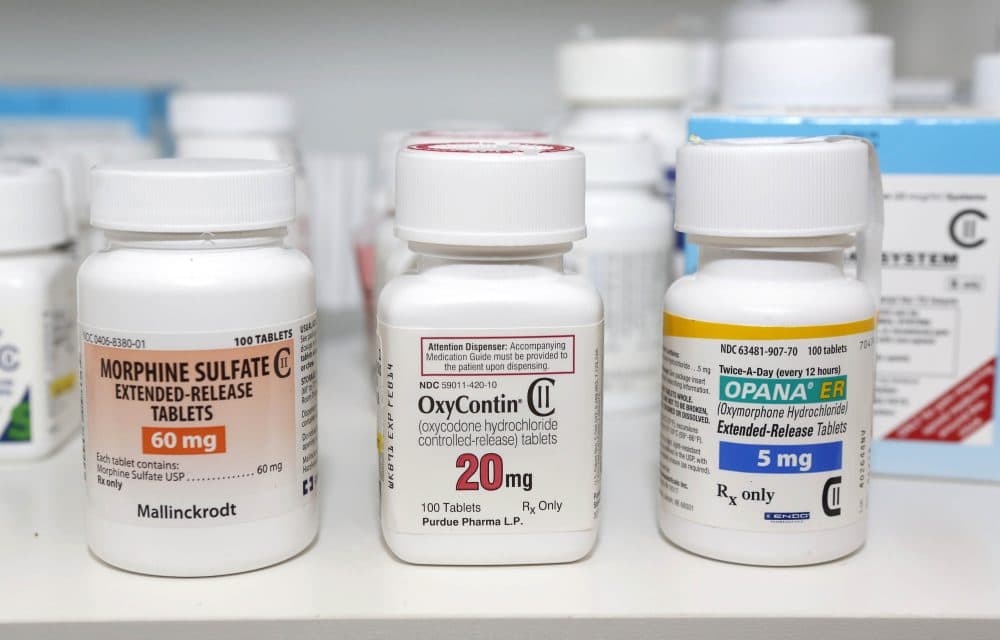Advertisement
Boston lawsuit alleges pharmacy benefit managers helped fuel opioid epidemic

The city of Boston is taking aim at another target in legal action over the ravages of the opioid epidemic.
A lawsuit filed by the city names some pharmacy benefit managers alleging they collaborated with drug makers to promote the use of prescription opioids, and helped fuel the subsequent creation of an illegal market for the powerful drugs. The companies deny the accusations.
"This case arises from the worst man-made epidemic in modern medical history — an epidemic of addiction, overdose and death caused by an oversupply of opioids flooding communities from powerful corporations who sought to profit at the expense of the public," the city's complaint said.
The defendants include major companies such as Express Scripts Pharmacy, ESI Mail Pharmacy Services and Optum Rx. The companies manage prescription drug benefits for many health plans, overseeing prescriptions for hundreds of thousands of people. The lawsuit alleges these pharmacy benefit managers, or PBMs, were central figures in distributing opioids, describing the companies as "gatekeepers to the opioid market."
In an emailed statement, Optum Rx denied the charges and said it has taken a "comprehensive approach to fight this issue." The company said it offers assistance to health care providers and its members to "address opioid abuse."
"Optum did not cause the opioid crisis or make it worse, and we will defend ourselves in this litigation," the company's statement said.
The plaintiffs are the city of Boston, it's Public Health Commission and the Boston Housing Authority.
Much attention has been focused on the hundreds of lawsuits filed against opioid manufacturers, distributors and retailers, but Boston's complaint is among the few targeting pharmacy benefit managers. Most of the suits have resulted in settlements with the corporations involved.
Boston's lawsuit accuses the pharmacy benefit managers of colluding with drug makers to maximize profits by prioritizing the prescribing of addictive opioids despite the risks. The companies, the lawsuit alleges, profited from deals with drug makers that made it easier to prescribe opioids in exchange for financial incentives.
The lawsuit also alleges the companies ignored their own data highlighting prolific prescribing that might have been used to identify and help ease some of the consequences of skyrocketing opioid use. The suit mentions a Massachusetts Health Policy Commission report urging increased state oversight of pharmacy benefit managers.
Advertisement
"This is kind of a novel theory," said University of Southern California law professor Adam Zimmerman, an expert on opioid litigation. "Usually when we sue for drugs that harm us, we're either focusing on the manufacturer of the drugs or the people at the front line selling us the drugs. We're not usually focusing on the middleman."
The complaint cites grim statistics outlining how the opioid epidemic has affected the nation and Boston specifically. It describes 251 overdose deaths in Boston in 2021, as well as increases in police and emergency medical responses to overdoses and "narcotic-related" incidents, drug paraphernalia and drug use in public libraries and parks, and a dramatic increase in the number of infants born with neonatal abstinence syndrome.
"Their conduct caused prescriptions and sales of opioids to skyrocket, and Defendants failed to limit their use even as evidence of the epidemic mounted," the city argued in its complaint, adding the companies bear some of the blame for "flooding the City with opioids and facilitating and encouraging the flow and diversion of opioids into an illegal, secondary market, resulting in devastating consequences to the City and its residents."
Zimmerman expects the Boston lawsuit to be a "bellwether case" that might result in a precedent for other municipalities to follow as they seek to hold companies financially responsible for the damage caused by the overprescribing of opioid painkillers that led to the nation's addiction crisis.
"One thing this case reflects is that the opioid epidemic wasn't really created by any one person or entity," Zimmerman said. "It took like a full-fledged regulatory breakdown as well as a major breakdown in institutional controls across the spectrum, across the entire distribution chain."
